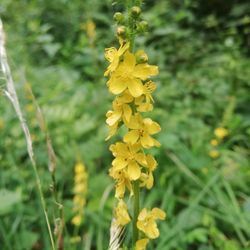No attributes recorded. For details refer to the original reference below.
"Medical part: the flowering plant cut an inch or 2 above the ground and dried. Agrimony has long been used as a popular domestic herbal remedy[4]. An astringent and mildly bitter herb, it is a helpful remedy for diarrhoea and a gentle tonic for the digestion as a whole[254]. The whole plant is antiaphonic, astringent, blood purifier, cholagogue, diuretic, tonic and vulnerary. It contains up to 5% tannin, which has a strongly astringent effect[244]. When taken internally, an infusion of the plant has a great reputation in the treatment of jaundice and other complaints of the liver[4, 7, 9, 13, 14, 21, 165], it is also used to treat diarrhoea and as a gargle for sore throats[244]. Externally, a strong decoction is used to treat wounds, skin problems, haemorrhoids etc[4, 7, 238, 244]. The plant is harvested in late spring and early summer and can be dried for later use[9]. The plant is used in Bach flower remedies - the keywords for prescribing it are 'Mental torture' and 'Worry, concealed from others'[209]. Contraindicated for hypersensitivity to plants from rose family. Contraindicated in pregnancy and during lactation[301]. The German Commission E Monographs, a therapeutic guide to herbal medicine approve Agrimonia eupatoria for diarrhoea, inflammation of the skin, inflammation of the mouth and pharynx (see [302] for critics of commission E)"
- PFAF References
"Large quantities could lead to digestive complaints and constipation due to its tannins"
- PFAF References
"Seed - dried and ground into a meal. A famine food, used when all else fails[179]. This report could refer to A. pilosa. Ledeb. (q.v.)."
- PFAF References
"A refreshing tea is made from the fresh or dried leaves, flowers and stems[2, 183]"
- PFAF References
"A refreshing tea is made from the fresh or dried leaves, flowers and stems[2, 183]. It can be drunk hot or cold[183]. It was formerly very popular either on its own or added to China tea, having a peculiar delicacy and aroma[4]"
- PFAF References
"A refreshing tea is made from the fresh or dried leaves, flowers and stems[2, 183]"
- PFAF References
